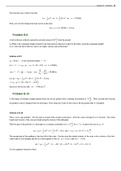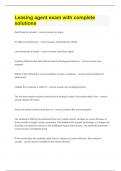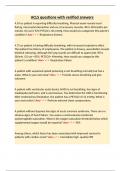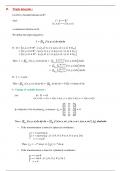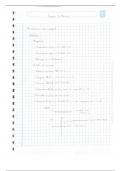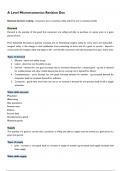CONSTITUTIONAL LAW 271
PART 1A: CONSTITUTIONAL HISTORY AND BASIC CONSTITUTIONAL
PRINCIPLES
CONSTITUTIONAL HISTORY
1. Role players in a constitutional democracy
Case study: EFF 1
Economic Freedom Fighters v Speaker, National Assembly and Others
Background information:
- President Zuma had upgrades done to Nkandla (private residence)
- Complaints lodged by Public Protector: some “security measures” were not
that (e.g. so called fire pool, visitors center etc.)
- PP released “secure in comfort” report stated Zuma must:
Pay back the tax money used for upgrades
Reprimand ministers who were involved
Report to national assembly on what he did
- Zuma did none of the above, except did report to Nasional Assembly
- NA launched own investigation and absolved Zuma from any wrongs
- EFF approached CC on finding of NA
In the case:
- EFF applied straight to the CC
Case involves President and NA
Too many integral values at stake
LQ: what is the nature of the remedial action of the PP?
Finding: Remedial action taken by PP is binding on the president
- The President acted inconsistent with the Constitution
- Violated the constitution that he was supposed to uphold as the
president
- More than enough reason for NA to remove him [impeachable offence]
- President must pay back reasonable costs for non-security upgrades
- NA’s decision to absolve President inconsistent with constitution
- MUST abide to PP’s decision unless he takes it to court to contest or
review
See Currie & de Waal “Constitutional and Administration Law Vol.1” pp40-57
[SUNLearn]
Discussion points:
Contemporary challenges
Democracy
Accountability
Judicial review
,History and background:
Unchecked abuse of power by state
o Apartheid system
o Move away from constitution
o Prof Slade: “reason for all current issues”
Severe limits to judicial review during Apartheid
NOW: approach court to check state power
Values adopted:
o Accountability
- Foundational value
- Court, PP, protests
o Rule of Law
o Supremacy of Constitution
- Everchanging
- Can be amended
Role players in a constitutional democracy:
1. National assembly
Legislative branch
Democratically elected
Decides on presidents & holds president accountable
Fail in constitutional obligation – others will step in = asking too much
2. State President
Head of state
Head of National Executive Authority
These positions complicated the system – powers to employ Inquiry
Commission, who investigates National Executive Authority = conflicts
constitutional obligation
3. Constitutional Court
Highest court in Judicial branch
Majority appointed by President
Judges must invalidate issue in conflict with Constitution
Difficult position for courts – can invalidate an elected official’s conduct
Sometimes goes too far in instructing parliament
4. Public Protector
Strengthens constitutional democracy (S9)
S182 Constitution = Powers of the PP
Can take appropriate remedial action – See EFF 1 finding
2. Colonial and apartheid constitutionalism
, Changes effected by Interim Constitution of 1993
1. Political equality -one person one vote, single voting role
2. Parliamentary monopoly of Westminster system replaced with legislative and
executive powers on national and political level
3. First past-the-post replaced with proportional representation
4. Parliamentary supremacy replaced by Constitutional supremacy
Constitutionalism pre-1994
Previous constitutions
o Union Constitution of 1910 – when SA became a union
o Republic Constitution of 1961 – when SA became republic
o Tri-cameral Constitution of 1983 – addressing external pressure
due to Apartheid system
Parliamentary supremacy = underlying basis of previous constitutions
No court of law competent to inquire into or pronounce upon the validity o any
law passed by parliament
o No substantive constraints on parliament to make laws
o Cannot invalidate laws based on substance, only procedure
o Parliament has monopoly of power
Sachs v Minister of Justice [NP]
“arguments are sometimes advanced which do seem to me to ignore the plain
principle that Parliament may make any encroachment it chooses upon the life,
liberty or property of an individual subject to it’s sway, and…it is the function of the
courts to enforce its will”.
Currie & De Waal → judicial perspectives in Sachs-case justified doctrine of
parliamentary supremacy and gave apartheid legislature free reign in attack on basic
principles of equality and human dignity.
Constitutional Crisis of the 1950’s
Engrained and enabled parliamentary supremacy and inroads based on race
Harris 1, 2 and Collins
Harris I
Harris v Minister of the Interior
- In cape coloureds with property could vote on common voters role
- NP wanted to remove them
- Was an entrenched provision in constitution – procedure to amend: 2
houses must sit together and can change if have 2/3 majority vote
- Sat separately and changed on simple majority
PART 1A: CONSTITUTIONAL HISTORY AND BASIC CONSTITUTIONAL
PRINCIPLES
CONSTITUTIONAL HISTORY
1. Role players in a constitutional democracy
Case study: EFF 1
Economic Freedom Fighters v Speaker, National Assembly and Others
Background information:
- President Zuma had upgrades done to Nkandla (private residence)
- Complaints lodged by Public Protector: some “security measures” were not
that (e.g. so called fire pool, visitors center etc.)
- PP released “secure in comfort” report stated Zuma must:
Pay back the tax money used for upgrades
Reprimand ministers who were involved
Report to national assembly on what he did
- Zuma did none of the above, except did report to Nasional Assembly
- NA launched own investigation and absolved Zuma from any wrongs
- EFF approached CC on finding of NA
In the case:
- EFF applied straight to the CC
Case involves President and NA
Too many integral values at stake
LQ: what is the nature of the remedial action of the PP?
Finding: Remedial action taken by PP is binding on the president
- The President acted inconsistent with the Constitution
- Violated the constitution that he was supposed to uphold as the
president
- More than enough reason for NA to remove him [impeachable offence]
- President must pay back reasonable costs for non-security upgrades
- NA’s decision to absolve President inconsistent with constitution
- MUST abide to PP’s decision unless he takes it to court to contest or
review
See Currie & de Waal “Constitutional and Administration Law Vol.1” pp40-57
[SUNLearn]
Discussion points:
Contemporary challenges
Democracy
Accountability
Judicial review
,History and background:
Unchecked abuse of power by state
o Apartheid system
o Move away from constitution
o Prof Slade: “reason for all current issues”
Severe limits to judicial review during Apartheid
NOW: approach court to check state power
Values adopted:
o Accountability
- Foundational value
- Court, PP, protests
o Rule of Law
o Supremacy of Constitution
- Everchanging
- Can be amended
Role players in a constitutional democracy:
1. National assembly
Legislative branch
Democratically elected
Decides on presidents & holds president accountable
Fail in constitutional obligation – others will step in = asking too much
2. State President
Head of state
Head of National Executive Authority
These positions complicated the system – powers to employ Inquiry
Commission, who investigates National Executive Authority = conflicts
constitutional obligation
3. Constitutional Court
Highest court in Judicial branch
Majority appointed by President
Judges must invalidate issue in conflict with Constitution
Difficult position for courts – can invalidate an elected official’s conduct
Sometimes goes too far in instructing parliament
4. Public Protector
Strengthens constitutional democracy (S9)
S182 Constitution = Powers of the PP
Can take appropriate remedial action – See EFF 1 finding
2. Colonial and apartheid constitutionalism
, Changes effected by Interim Constitution of 1993
1. Political equality -one person one vote, single voting role
2. Parliamentary monopoly of Westminster system replaced with legislative and
executive powers on national and political level
3. First past-the-post replaced with proportional representation
4. Parliamentary supremacy replaced by Constitutional supremacy
Constitutionalism pre-1994
Previous constitutions
o Union Constitution of 1910 – when SA became a union
o Republic Constitution of 1961 – when SA became republic
o Tri-cameral Constitution of 1983 – addressing external pressure
due to Apartheid system
Parliamentary supremacy = underlying basis of previous constitutions
No court of law competent to inquire into or pronounce upon the validity o any
law passed by parliament
o No substantive constraints on parliament to make laws
o Cannot invalidate laws based on substance, only procedure
o Parliament has monopoly of power
Sachs v Minister of Justice [NP]
“arguments are sometimes advanced which do seem to me to ignore the plain
principle that Parliament may make any encroachment it chooses upon the life,
liberty or property of an individual subject to it’s sway, and…it is the function of the
courts to enforce its will”.
Currie & De Waal → judicial perspectives in Sachs-case justified doctrine of
parliamentary supremacy and gave apartheid legislature free reign in attack on basic
principles of equality and human dignity.
Constitutional Crisis of the 1950’s
Engrained and enabled parliamentary supremacy and inroads based on race
Harris 1, 2 and Collins
Harris I
Harris v Minister of the Interior
- In cape coloureds with property could vote on common voters role
- NP wanted to remove them
- Was an entrenched provision in constitution – procedure to amend: 2
houses must sit together and can change if have 2/3 majority vote
- Sat separately and changed on simple majority

